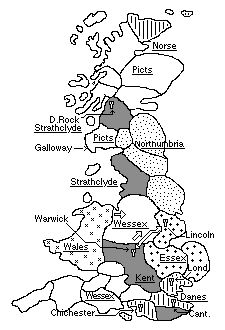 Bretwalda
Bretwalda Bretwalda
Bretwaldaby Mike Demana (article originally appeared in The Herald #31)
One Wolfpack
As Winter passed and the sea lanes opened again, great and terrible news was brought from across the North Sea to the inhabitants of Britain. King Olaf of the Norse had won the war with his rival Danes. All Viking jarls in Britain now owed allegiance to him, allowing a single hand to direct the movements of the sea wolves.
Perhaps dispirited by this ill news, the Danes besieging Dover allowed themselves to be attacked and routed by the Kentish army. Victorious general Aelfred was in no mood for mercy, though. He followed the beaten Danes back to their North Kentish stronghold of Canterbury and besieged it. Leaving only a small garrison to hold the town, the rest of the Danes fled to sea. Their garrison at Londinium had hopes the fleet was headed to their relief, but word came it had continued northward. The Danes in Londinium endured their fourth month of siege by the warriors of Essex.
The Norse were in high spirits, though. By a clever ruse, they attacked and retook Chichester, capital of Sussex. The Wessex army that had just recovered it for their Kentish allies had to recross the border. When they laid their siege lines, the Norse left a small garrison and slipped to sea, also.
 Marriage
and Bad Blood
Marriage
and Bad Blood
A chapter of history closed when beleaguered King Coenwulf of Mercia handed his only child, Egthwine, in marriage to King Baldred of Essex. After the bridal feast, he bequeathed his kingdom to his daughter and retired to a monastery. Baldred, who now controlled the armies of both kingdoms, declared any son of the union would be his heir.
This stealthy diplomacy caught his erstwhile ally, Wessex, by surprise. An invading host was stunned to see Essex troops in Lincoln. A tension-fraught stare down ensued. Wessex blinked, though, and retired to Warwick. Their army was amazed to awake, days later and see an Essex host had followed them. No hostile move was made by either army, nor the Kentish garrison that ruled the province. At this point last year, all three kingdoms were allies. Now, who can tell?
Best-laid plans...
King Circinn of the Picts is reckoned by his tribesmen as the cleverest man in all Britain. Subtly, with marches and countermarches of small forces, he had checkmated his opponent, King Ravenhawk of Strathclyde. The two great armies faced each other in a valley not far from where the Britons besieged Pictish-held Dumbarton Rock. Lining every trail and pass out of the valley, though, were more Picts. The Strathclyde army was trapped. If beaten, it would be utterly destroyed, and the kingdom would doubtless fall.
The blind witches who weave the fate of kings on their tapestry cackled, though, and decreed otherwise. Strathclyde's army triumphed in battle, and Circinn's carefully laid plans were scattered to the wind like a pile of leaves. The Briton citizens of Dumbarton Rock rioted in celebration and overthrew their Pictish garrison, enabling Strathclyde to retake its ancient capital. However, a week later, the town awoke to sobering news. The Picts had conquered their province of Galloway, in the meantime. The war would drag on.
And in a final, mysterious note, a Welsh army burst forth from the Black
Hills, crossed Offa's Dyke into Wessex-held Elmet. It marched past the capital
of Chester, though, and disappeared northwards into Northumbria. Where it
was going none but the Welsh could guess...